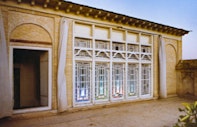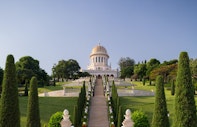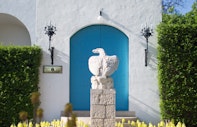What Bahá’ís Believe
Bahá’u’lláh and His Covenant
The Báb — Herald of the Bahá’í Faith
Articles and Resources
- What Bahá’ís Believe
- Overview
- Bahá’u’lláh and His Covenant
- The Life of the Spirit
- God and His Creation
- Essential Relationships
- Universal Peace
- What Bahá’ís Do
A selection of essays, articles and resource materials which further explore the life of the Báb and His mission.
Writings of the Báb
In this volume—written near the end of 1847 or the beginning of 1848—the Báb presented the essential elements of His religious laws and concepts, and anticipated the World Order of Bahá’u’lláh.
In this letter, the Báb challenged the Shah of Iran to reflect on the treatment which He had received and the nature of His mission.
Originally regarded as the “Qur’an’ of the Bábís”, this volume was revealed by the Báb at the start of His ministry and established His Writings to be “new verses from God”. Bahá’u’lláh described the Qayyúmu'l-Asmá as “the first, the greatest and mightiest of all books”.
The Báb revealed the Dalá’il-i-Sab‘ih (the “Seven Proofs”) while incarcerated in Mah-Ku. In it, He sets out the truth of His mission.
The Kitáb-i-Asmá (the “Book of Names”) was revealed by the Báb during His imprisonment in Mah-Ku and Chihriq and comprises some 3000 pages.
Other Resource Materials
This short collection of extracts gathers together some of the tributes paid to the Báb by Bahá’u’lláh and ‘Abdu’l-Bahá.
In this extract from a letter addressed to the Bahá’ís of the West known as The Dispensation of Bahá’u’lláh, Shoghi Effendi explains the station of the Báb.
In this extract from God Passes By, Shoghi Effendi recounts the events surrounding the execution of the Báb.
In this article, first published in the 1994-5 edition of The Bahá’í World, Douglas Martin considers the Revelation of the Báb in the context of its impact on the Western writers of the period and its subsequent influence.
In this essay, first published in the 1932-4 edition of The Bahá’í World, Mary Maxwell—later known as Amatu’l-Bahá Rúhíyyih Khánum, following her marriage to Shoghi Effendi in 1937—reflects on the dominant themes of The Dawn Breakers; an early narrative of Bábí history authored by Nabil-i-A’zam.
This brief article gathers together appreciations of the Báb penned by prominent individuals such as the novelist Leo Tolstoy and statesman George Nathaniel Curzon.
Further Reading
A list of further reading on this subject is available here.







